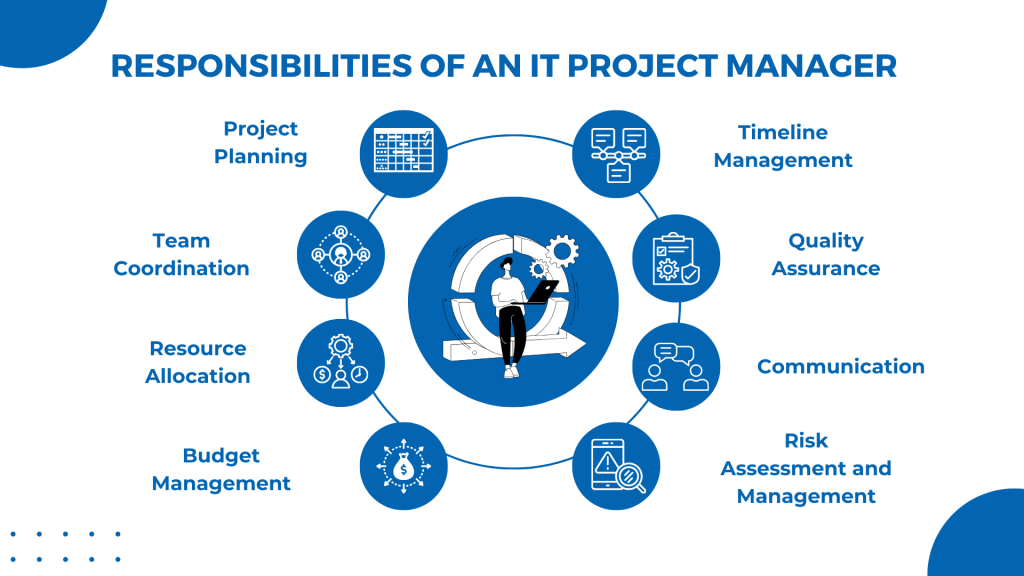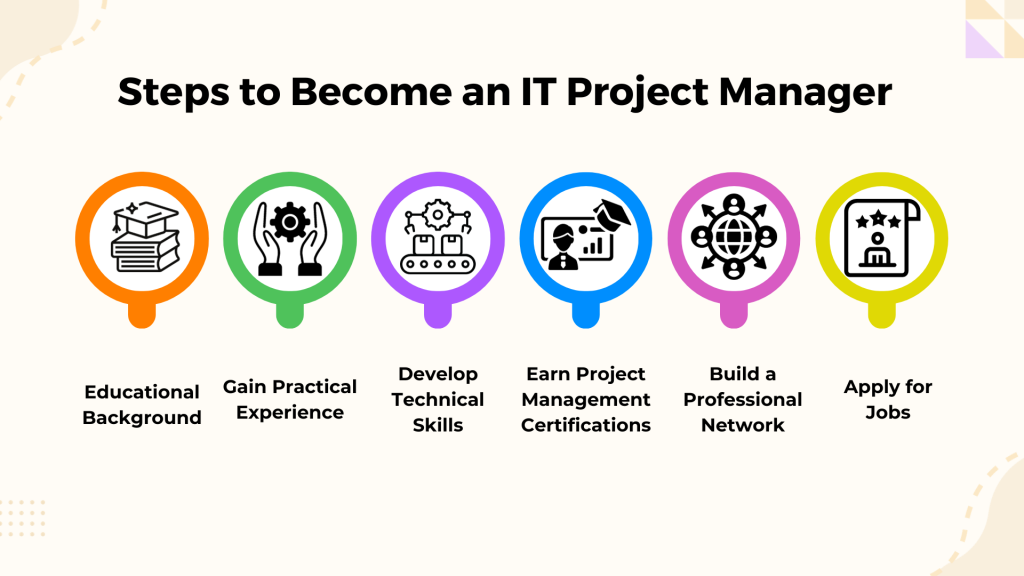
Hey there, tech enthusiasts, future project managers, and curious minds alike! Have you ever wondered about the wizards behind the seamless apps you use or the innovative software transforming industries?
Well, that’s where IT Project Managers come into play and trust us, their world is nothing short of fascinating! Buckle up as we embark on a captivating journey with our guide, “What is an IT Project Manager?” Think of this as your backstage pass to the digital universe, where we peel back the curtain to reveal the real superheroes orchestrating the magic of technology.
Whether you’re a dreamer with big ideas, a seasoned pro looking to sharpen your skills, or just someone intrigued by the mechanics of the digital world, you’re in for a treat. We’ll uncover the skills they wield, the challenges they face, and the awe-inspiring impact they make, all in language that’s as relatable as your favorite coffee shop conversation.
Prepare to understand the strategic minds shaping our technological future profoundly. Your enlightening expedition begins here.
What is an IT Project Manager?
An Information Technology Project Manager is a skilled professional overseeing and managing technology-related projects within an organization. Their primary role is to ensure that IT projects are planned, executed, and completed successfully, meeting specific objectives, deadlines, and budget constraints.
IT Project Managers are crucial in bridging the gap between technical teams and business stakeholders, translating complex technical requirements into understandable terms for non-technical decision-makers.
IT Project Manager coordinates various aspects of a project, such as defining project goals, creating project plans, allocating resources, managing budgets, assessing risks, and ensuring timely delivery.
Moreover, they are adept at team leadership, communication, problem-solving, and strategic thinking. Their expertise is vital in developing and implementing software applications, system upgrades, network installations, and other technology-related initiatives, contributing significantly to an organization’s overall efficiency and success.
What Does an IT Project Manager Do?
An IT Project Manager plays a pivotal role in technology-driven initiatives within an organization. Their primary responsibility is to ensure the successful planning, execution, and completion of IT projects. This multifaceted role involves a range of roles and responsibilities:
Project Planning
IT Project Managers meticulously plan every aspect of a project, defining its scope, objectives, timelines, and resource requirements. They create detailed project plans that act as roadmaps throughout the project lifecycle.
Team Coordination
They assemble and lead teams of diverse professionals, from programmers and designers to analysts and engineers. IT Project Managers ensure everyone understands their roles and responsibilities, fostering a collaborative and efficient work environment.
Resource Allocation
Managing resources, both human and material, is a crucial aspect. Project Managers allocate tasks based on team members’ skills and expertise, ensuring optimal utilization of available resources.
Budget Management
IT Project Managers are responsible for budgeting and financial aspects of the project. They monitor expenses, track costs, and make sure the project stays within the allocated budget.
Risk Assessment and Management
Identifying potential risks and devising effective risk mitigation strategies is a significant part of their role. They foresee potential challenges, create backup strategies, and handle unexpected issues that might emerge throughout the project.
Communication
IT Project Managers act as intermediaries between technical teams and non-technical stakeholders. They translate complex technical jargon into understandable language for clients and company executives, ensuring everyone is on the same page.
Quality Assurance
They oversee the quality of the project deliverables, ensuring they meet industry standards and client expectations. Quality assurance includes rigorous testing, debugging, and validation processes.
Timeline Management
Keeping the project on schedule is paramount. IT Project Managers monitor timelines closely, making adjustments when necessary to ensure deadlines are met without compromising the project’s quality.
Types of Projects an IT manager is responsible for
IT managers oversee various projects, ensuring technology solutions align with organizational goals, meet quality standards, and enhance operational efficiency. Here’s an explanation of the types of projects an IT manager is responsible for:
- Software Development: IT managers oversee the creation of software applications, ensuring they meet quality standards, deadlines, and client requirements
- Mobile Application Development: They manage the development of mobile apps, coordinating teams to create user-friendly and functional applications for smartphones and tablets
- Web Development: IT managers supervise web development projects, ensuring websites are responsive, secure, and optimized for seamless user experiences
- Database Management: When managing databases, IT managers handle data organization, storage, retrieval, and security, ensuring databases operate efficiently
- Backup and Recovery: IT managers implement backup solutions to safeguard data. They design recovery strategies, ensuring quick restoration in case of data loss
- Cloud Migration: They plan and oversee the migration of data, applications, and services to cloud platforms, ensuring a smooth transition and optimized cloud usage
- Software Implementation: IT managers manage the implementation of new software systems, ensuring proper installation, configuration, and user training for seamless adoption
- Hardware Installation: Overseeing the installation of hardware components, IT managers ensure computers, servers, and other devices are set up correctly and integrated into the network
- Network Configuration: They handle network setup and configuration, ensuring secure connections, efficient data flow, and effective communication between devices
- Infrastructure Management: IT managers are responsible for overall IT infrastructure, including servers, storage, and networking equipment. They optimize resources, ensuring reliable and scalable IT operations
Key Skills and Qualities Required for IT Project Management
Understanding the key skills for the position might help you enhance your professional capabilities if you seek a career as an IT project manager. An IT project manager must have the following skills and qualities:
Technical Proficiency
IT Project Managers need in-depth knowledge of technologies and programming languages, enabling them to understand project complexities and make informed decisions. This expertise allows them to communicate effectively with technical teams and address project challenges confidently.
Effective Communication
Clear and concise communication is essential for IT Project Managers. They must convey complex technical concepts to team members and non-technical stakeholders, fostering a shared understanding of project goals and expectations. Strong communication skills enable them to manage client interactions, address concerns, and maintain transparency throughout the project.
Leadership and Team Management
IT Project Managers excel in guiding diverse teams by delegating tasks, providing clear instructions, and encouraging collaboration. Their leadership skills empower team members, resolve conflicts, and inspire collective achievement. Effective team management includes understanding group dynamics, fostering teamwork, and recognizing and celebrating team successes.
Problem-Solving and Adaptability
Strong problem-solving abilities are crucial for IT Project Managers to identify and resolve issues promptly. They must adapt to changing project requirements, making well-informed decisions under pressure. Proactively anticipating challenges, analyzing root causes, and implementing effective solutions ensures project continuity and success.
Strategic Thinking and Planning
IT Project Managers plan strategically, aligning project objectives with organizational goals. Strategic thinking involves foreseeing potential challenges, planning for contingencies, and making decisions that benefit the project in the long run. Strategic planning ensures that resources are utilized efficiently, and project outcomes align with the overarching organizational strategy.
How to Become an IT Project Manager?
Becoming an IT Project Manager involves a strategic and structured approach to developing the necessary skills and expertise. If you’re interested in a career as an IT project manager, take the following steps:
Educational Background
Start your journey by enrolling in a relevant bachelor’s program, like computer science or business management. These foundational courses provide essential knowledge about IT systems, project management methodologies, and business processes.
Pursuing advanced degrees or specialized certifications, such as a Master’s in Project Management, refines your expertise and enhances your marketability.
Gain Practical Experience
Practical exposure is invaluable. Seek internships or entry-level positions in IT or project management departments. These roles expose you to real-world project scenarios, teaching you to navigate challenges, collaborate in teams, and apply theoretical knowledge.
Volunteer work on community projects or open-source initiatives can provide hands-on experience and demonstrate your commitment to the field.
Develop Technical Skills
Master key technical skills related to IT project management. This includes learning programming languages like Java or Python, understanding database management systems (e.g., SQL), and gaining proficiency in project management software such as Microsoft Project or JIRA.
Building a robust technical foundation enables you to comprehend project complexities, troubleshoot issues, and effectively communicate with technical teams.
Earn Project Management Certifications
Pursuing recognized project management certifications like PMP, PRINCE2, and CAPM is crucial. These certifications validate your knowledge of industry-standard project management practices.
Dedicated study and passing certification exams demonstrate your expertise and commitment, making you a credible candidate for IT Project Manager positions. Many employers value these certifications as they ensure a standardized understanding of project management principles.
Build a Professional Network
Actively engage in industry events, conferences, and online forums. Networking exposes professionals in your field, offering mentorship opportunities, industry insights, and potential job openings.
Building relationships with experienced practitioners can provide invaluable advice, expand your knowledge base, and offer diverse perspectives on IT project management challenges and solutions.
Apply for Jobs
Craft a resume highlighting your qualifications as an IT Project Manager, emphasizing areas that showcase your key competencies, such as network maintenance and team management. Utilize impactful action verbs to describe your skills and experience positively.
Prior to applying for a position, thoroughly review the job listing, identifying specific skills and requirements that align with your expertise. Modify your resume accordingly, emphasizing these key points to present yourself effectively to potential employers.
How Much Does an IT Project Manager Earn?
The salary of an IT Project Manager can vary significantly based on several factors, including experience, education, location, industry, and the organization’s size. On average, IT Project Managers earn a competitive salary, often well above the national average, due to the specialized skills and responsibilities associated with the role.
Over the next decade, the demand for project managers is rising faster than many other professions. However, organizations face potential risks due to this shortage of skilled professionals.
According to the recent talent gap analysis commissioned by PMI and conducted by Anderson Economic Group (AEG), there are remarkable prospects for job opportunities and career advancement for project managers in the 11 countries examined.
The workforce focused on project management across seven sectors emphasizing project-oriented roles is anticipated to expand by 33 percent, resulting in nearly 22 million new jobs by 2027.
Here is a table that shows the salary of an IT Project Manager in the top countries:
| Country Name | Salary |
| United States of America (USA) | $99307 |
| India | ?16,45,000 |
| Australia | AU$112522 |
| United Kingdom (UK) | £68,189 |
| Canada | CA$1,05,314 |
| Singapore | S$78673 |
| South Africa | R481,237 |
| UAE (United Arab Emirates) | AED 199331 |
| Germany | €73,750 |
| Switzerland | $122992 |
| New Zealand | NZ$1,20,000 |
Key Challenges that an IT Project Manager Faces
IT Project Managers confront several key challenges in their roles, each requiring strategic solutions for successful project outcomes:
- Controlling evolving project requirements and managing scope changes effectively
- Balancing time, budget, and workforce efficiently to optimize project resources
- Navigating diverse teams, resolving conflicts, and fostering teamwork for project success
- Staying updated with rapid tech changes, integrating new technologies seamlessly into projects
- Managing diverse stakeholder expectations, aligning perspectives, and handling feedback diplomatically
- Anticipating and mitigating unforeseen events, developing contingency plans to address challenges
- Ensuring project deliverables meet high-quality standards through rigorous testing and monitoring
- Efficiently prioritizing tasks, adhering to schedules, and preventing delays for timely project completion
Conclusion
As we wrap up our exploration of “What is an IT Project Manager”, it’s clear that these professionals are the unsung heroes behind every successful tech venture. Beyond the technical jargon and project plans, they bring a human touch to the digital realm.
Their expertise, coupled with empathy and unwavering determination, shapes technology’s future in profound and personal ways. For those aspiring to step into this role, remember it’s not just about managing codes and timelines; it’s about understanding the dreams and challenges of the people you serve.
Please add the future perspective here as well
The future perspective of IT Project Managers is exceptionally promising, marked by the increasing integration of technology in businesses worldwide. Employers will require roughly 88 million project management professionals by 2027. These statistics predict that there will be a massive demand for IT Project managers. With a focus on emerging technologies such as artificial intelligence, blockchain, and cybersecurity, IT Project Managers are poised to lead organizations toward enhanced efficiency, competitive advantage, and sustainable growth, making their expertise indispensable in the evolving landscape of IT projects.
In a world where technology is the heartbeat of progress, the IT Project Manager embodies the perfect blend of human understanding and technical finesse, making them indispensable architects of our digital future.
















